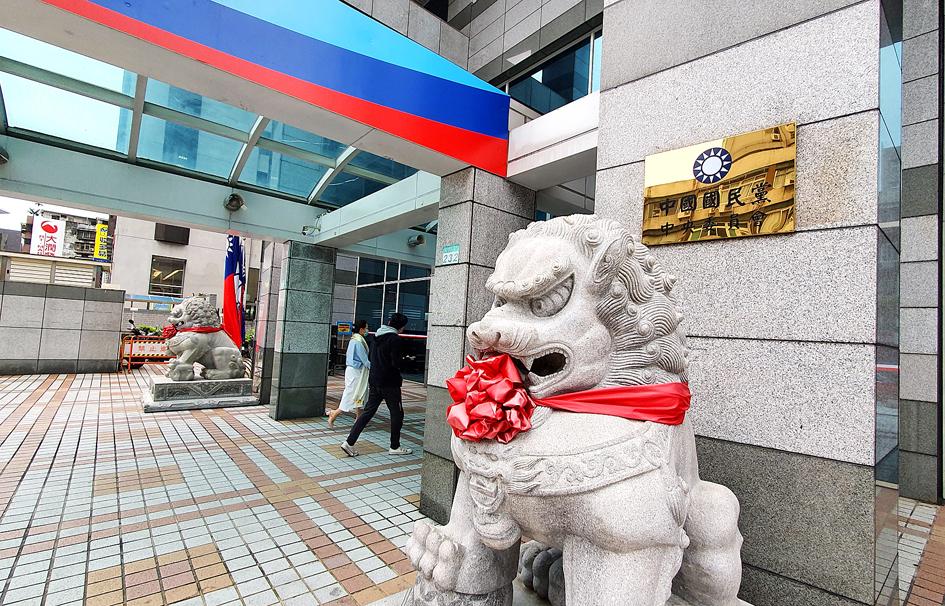The Chinese Nationalist Party (KMT) on Sunday said that it is not seeking to improve relations with the US or China at the expense of the other, and that its relations with the countries would be topic-based.
The party has faced questions over its foreign policy after it on Monday last week announced its withdrawal from the annual Straits Forum and delayed planned talks with the American Institute in Taiwan (AIT).
The party has also taken a tough stance on the importation of US meat containing ractopamine, while also lambasting China for increasing its military activity in and around the Taiwan Strait.

Photo: Chang Chia-ming, Taipei Times
Following the lead of KMT Chairman Johnny Chiang (江啟臣), the party is to seek “value” in its relations with the US and China, party sources said.
The AIT had invited five officials, including Chiang, to a luncheon, which political commentators speculated was related to the KMT’s opposition to US meat imports, but the KMT put off the meeting, citing scheduling conflicts.
Chiang has said that the KMT hopes to improve communication with the US, and that one way it sought to do so was through a representative office there, but has had difficulty managing the large expense of such an endeavor.
Having two KMT members stationed in the US would cost the party a minimum of US$500,000 per year, which includes rent and personnel costs, party sources said.
Sentiment within the KMT was that there were no problems with its relationship with either the US or China, but that media speculation had caused confusion about the party’s stance in withdrawing from the Straits Forum and in its delay in meeting with the AIT, the sources said.
The party felt it was appropriate to withdraw from the forum due to Chinese media equating its planned attendance to “suing for peace,” and its absence from the AIT luncheon was simply due to timing, but the KMT hopes to have another opportunity to attend, they said.
On major Taiwan-US issues, the KMT has been supportive of the “reasonable” procurement of military equipment from the US and US Under Secretary of State Keith Krach’s visit to Taiwan, but on the issue of US meat imports, it was only opposed to products containing ractopamine, party sources said.
Regarding China, the party supports cross-strait exchanges, which is why it had initially planned to attend the Straits Forum, they said.
There are some KMT members who take an anti-US stance, but they do not represent the party’s official position on the US, they added.
The party has rejected a statement by China’s Taiwan Affairs Office that recent Chinese military activity near Taiwan was intended to protect “national sovereignty,” the sources said.
The KMT also plans to be more vocal in its opposition to the use of concentration camps in Xinjiang if clear evidence of the camps surfaced, they added.

A Taiwanese software developer has created a generative artificial intelligence (AI) model to help people use AI without exposing sensitive data, project head Huang Chung-hsiao (黃崇校) said yesterday. Huang, a 55-year-old coder leading a US-based team, said that concerns over data privacy and security in popular generative AIs such as ChatGPT and DeepSeek motivated him to develop a personal AI assistant named “Mei.” One of the biggest security flaws with cloud-based algorithms is that users are required to hand over personal information to access the service, giving developers the opportunity to mine user data, he said. For this reason, many government agencies and

The National Fire Agency on Thursday said a series of drills simulating a magnitude 8.5 earthquake would be held in September to enhance the government’s emergency response capabilities. Since earthquakes cannot be predicted, only by continuously promoting disaster prevention measures could Taiwan enhance its resilience to earthquakes, agency Director-General Hsiao Huan-chang (蕭煥章) said in a news release. The exercises would be held to mark annual National Disaster Prevention Day on Sept. 21, the aim of which is to test Taiwan’s preparedness and improve its earthquake resilience in case of a major temblor, Hsiao said. As part of those drills, an earthquake alert would

DEFENSE: The National Security Bureau promised to expand communication and intelligence cooperation with global partners and enhance its strategic analytical skills China has not only increased military exercises and “gray zone” tactics against Taiwan this year, but also continues to recruit military personnel for espionage, the National Security Bureau (NSB) said yesterday in a report to the Legislative Yuan. The bureau submitted the report ahead of NSB Director-General Tsai Ming-yen’s (蔡明彥) appearance before the Foreign and National Defense Committee today. Last year, the Chinese People’s Liberation Army (PLA) conducted “Joint Sword-2024A and B” military exercises targeting Taiwan and carried out 40 combat readiness patrols, the bureau said. In addition, Chinese military aircraft entered Taiwan’s airspace 3,070 times last year, up about

STRICTER ENFORCEMENT: Taipei authorities warned against drunk cycling after a sharp rise in riding under the influence, urging greater public awareness of its illegality Taipei authorities have issued a public warning urging people not to ride bicycles after consuming alcohol, following a sharp rise in riding under the influence (DUI) cases involving bicycles. Five hundred and seven people were charged with DUI last year while riding YouBikes, personal bicycles, or other self-propelled two-wheelers — a fourfold increase from the previous year, data released by the Taipei Police Department’s Traffic Division showed. Of these, 33 cases were considered severe enough to be prosecuted under “offenses against public safety,” the data showed. Under the Road Traffic Management and Penalty Act (道路交通管理處罰條例), bicycles — including YouBikes and other